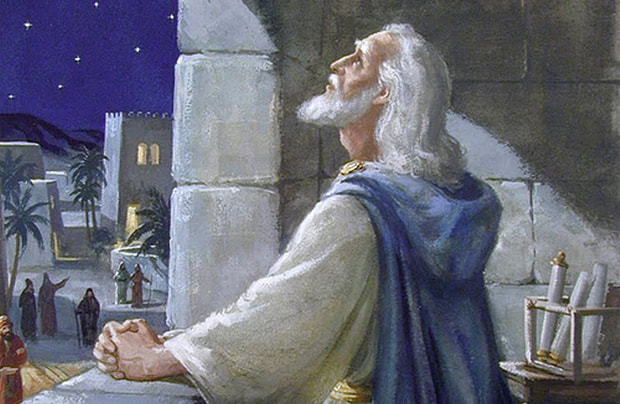|
Daniel 9:4b-10 (NRSVCE) “Ah, Lord, great and awesome God, keeping covenant and steadfast love with those who love you and keep your commandments, we have sinned and done wrong, acted wickedly and rebelled, turning aside from your commandments and ordinances. We have not listened to your servants the prophets, who spoke in your name to our kings, our princes, and our ancestors, and to all the people of the land. “Righteousness is on your side, O Lord, but open shame, as at this day, falls on us, the people of Judah, the inhabitants of Jerusalem, and all Israel, those who are near and those who are far away, in all the lands to which you have driven them, because of the treachery that they have committed against you. Open shame, O Lord, falls on us, our kings, our officials, and our ancestors, because we have sinned against you. To the Lord our God belong mercy and forgiveness, for we have rebelled against him, and have not obeyed the voice of the Lord our God by following his laws, which he set before us by his servants the prophets. It doesn’t get much more fitting for a penitential season than this. Lent is a time for us to fast and pray, so that we might acknowledge our sins and take our faith more seriously not only now, but always. It’s a time for us to ask for God’s mercy, for it is not long before we will remember the day we committed the most heinous of sins. The day that we murdered Christ.
Here we have Daniel acting as an example for us. He pleads with God to have mercy on the people of Jerusalem and all of Israel for the sins they have committed. God gave them commandments, and they broke them. God sent them prophets, and they ignored them. God asked one simple thing of them: “Follow me.” And they turned away. Daniel may as well be speaking here and now, as his confession applies equally to us. Shame covered Israel then, just as it covers us now. Remember yesterday what we read from St. Paul about shame and humiliation? The ones who are on the path of destruction are too covered in shame, but they fool themselves into thinking it is glory. It’s only those who recognize their shame and come to God in humility that will be saved. Daniel sees Israel’s shame, and his own, for what it is. He sees how unworthy they are of God’s blessings, and he knows the only thing he can do is come to God in earnest repentance and ask for grace and mercy. But this seems to be where we diverge from Daniel. We are covered in shame, certainly, because of our sins. But we appear to revel in it. We no longer feel our shame. Instead, we simply whisk it away, filling our minds and hearts with more and more things to distract us from the truth of our sin. Instead of turning to God, as Daniel did, we turn to the world. We are on the path to destruction. This is why confession and penance are so important, why Lent is so important. Until we look past the things we use to distract ourselves and actually look upon our own sin, we will never recognize our shame, and thus we will never be able to turn toward the path that leads to God. There are three parts to the sacrament of reconciliation (what most people simply call “confession”). There is the examination of conscience, in which we reflect on our sin, seeing it for what it is and how it harms our lives and the lives of those around us, so that we might ask God for forgiveness and mercy. There is the confession itself, in which we confess our sins, ask for forgiveness, and receive absolution. And there is the penance, in which we work to reorient ourselves—turn away from the path of destruction and toward the path of life. This is what Lent is about. Reorienting ourselves to more closely follow the narrow path of life. But we can only begin to do that if we are able to ask God for forgiveness. And we can only make an honest prayer for forgiveness if we first see our sin for what it is, as Daniel did. |
ArchivesCategories
All
|

 RSS Feed
RSS Feed